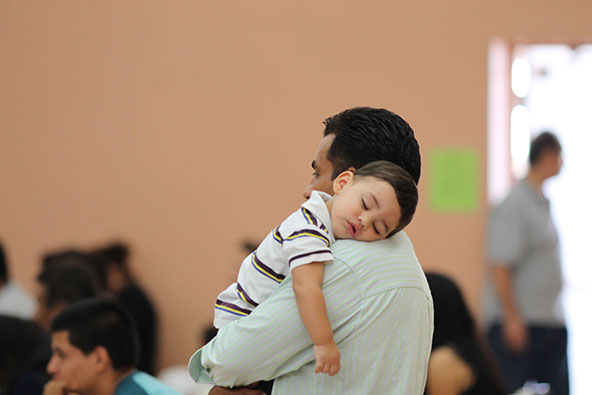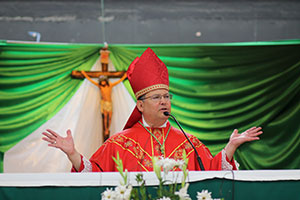
Fernando Peña held his year-old son Juan Pablo in his arms as he received the Blessed Sacrament Aug. 24 at Immaculate Heart of Mary Parish. He joined hundreds of others for Mass with Auxiliary Bishop Eduardo A. Nevares.
Peña, an undocumented immigrant, is married to a U.S. citizen. The couple is expecting their second child next month.
“Let’s see how many more children God gives us,” he said, holding Juan Pablo’s hand after Mass. “We’re immigrants, and we’re here. We just haven’t been legalized yet.”
News of a possible military involvement in Syria shoved immigration reform speculation out of the media spotlight. But the promise of reform and the threat of deportation are ever present in the minds of immigrant families — particularly those with mixed legal status like the Peñas.
The bishop celebrated the Aug. 24 Mass for immigrants with that in mind. Dioceses across the United States — from El Paso to Anchorage — prayed for immigration reform during Masses in August and September.
“The efforts of the Catholic Church are known by God,” Bishop Nevares said in his bilingual homily. “We don’t walk through the streets saying, ‘look at me.’ But we must tell the Hispanic people, ‘We have not forgotten you.’”
The bishop said many have asked him why the Church gets involved with something political like immigration.
“For the Church, this is not something political,” the bishop explained. “These are our brothers and sisters in Christ and they deserve to be treated with respect. We’re praying for a law through which families can live in peace and prosperity.”
Crosier Brother Jim Lewandowski, who helps immigrants apply for citizenship, said many families of mixed-legal status live in fear of being split up.
“Any reform that develops should give hope that families won’t be separated, but stay united,” Bro. Jim said.
The Department of Homeland Security last August postponed deportation for qualifying young undocumented immigrants, given their parents brought them into this country at an early age. Bro. Jim said the program — the Deferred Action for Childhood Arrivals, known as “DACA” — alleviated anxiety among undocumented young adults.
While younger immigrants can stay, the law has not stopped their parents’ removal from the United States.
“It can be a real problem,” Bro. Jim said.
Having a family member that is a U.S. citizen is no guarantee of obtaining legal status, he said. Immigrants who enter without papers have a tough time getting legal residency.
‘Strangers No Longer’
Ten years ago, the Mexican and U.S. bishops issued a joint pastoral letter titled “Strangers No Longer: Together on the Journey of Hope.” In it they detailed the Church’s vision for comprehensive immigration reform.
“As pastors, we are troubled by how the current amalgamation of immigration laws, policies, and actions pursued by both governments often impedes family unity. While the majority of Mexican migrants enter the United States to find work, many cross the border to join family members,” they wrote.
When families are separated, it undermines the dignity of the human person, the bishops explained.
“Regardless of their legal status, migrants, like all persons, possess inherent human dignity that should be respected,” they wrote. “Often they are subject to punitive laws and harsh treatment from enforcement officers from both receiving and transit countries. Government policies that respect the basic human rights of the undocumented are necessary.”
In 2004, the U.S. bishops’ started an initiative called “Justice for Immigrants” to lobby for comprehensive immigration. The campaign stated that the U.S. bishops do not support illegal immigration. The bishops support an earned legalization program, not amnesty.
The Arizona bishops wrote that Catholic teaching “recognizes that nations have the right to control their own borders and to regulate immigration, but that this right is not absolute,” in a 2005 pastoral letter titled, “You Welcomed Me.”
“It is often easy to overlook the hardships that undocumented immigrants must endure to reach the United States, to cross the border, to live in a country in which they are not legally recognized and often subjected to discrimination and abuse,” the bishops wrote in their immigration pastoral. “Parents, children, and grandchildren are separated, often for years on end. Whole communities are split up or abandoned, and cultural traditions are lost.”
The Arizona bishops have consistently opposed state legislation that does not take into account the dignity of undocumented immigrants and their families.


Progress?
In August, the Arizona Catholic Conference, the political arm of the Catholic dioceses in the state, issued an action alert calling for Catholics to urge Congress to pass “just and compassionate” immigration reform. Ron Johnson, executive director of the conference, said he received some negative feedback from local Catholics.
“It’s still a hot issue,” he said. “But I think things are changing.”
In March, the Pew Research Center reported that most U.S. Catholics favor giving undocumented immigrants a path to legal residency.
“The role of the Church is the most important,” according to Delia Salvatierra, a Catholic immigration attorney who also took part in a panel discussion with Bishop Nevares after the Aug. 24 Mass. “Legislators listen to the Church and they listen to the people. They don’t listen to us lawyers.”
Several panel participants noted that it’s impossible to predict when Congress will pass immigration reform and what it will mean for any one individual. They encouraged immigrants and their families to keep watch.
Immigrants looking for counsel can consult legal services provided by the Church — like Catholic Charities. Many legal representatives in the community make outlandish promises and prey on vulnerable immigrants.
Pew estimates that 11.1 million immigrants live without legal status in the United States.
“We’re waiting for the federal government to do something,” Johnson said, noting how the federal government blocked implementation of the controversial SB 1070 immigration crackdown in Arizona. “There’s not much states can do.”
In the meantime, Bishop Nevares said, the Church will continue to be in solidarity with immigrants. Christ and His Church stand with the marginalized.
“The Church is here for all immigrants,” he said. “Our Church doesn’t ask for papers and she doesn’t ask your religion. We just keep our doors open to all.”
Justice for Immigrants
To learn more about the U.S. bishops’ push for comprehensive reform, visit: justiceforimmigrants.org





